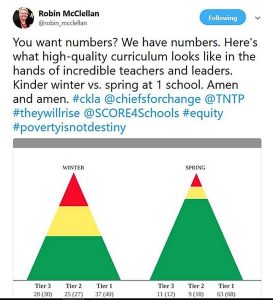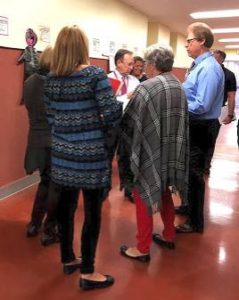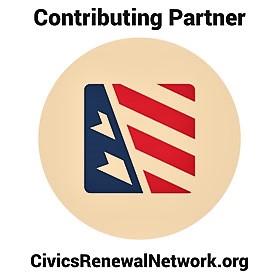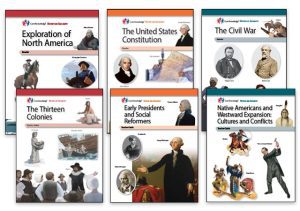In Memphis, Tennessee, the Libertas School combines the Montessori approach with Core Knowledge Language Arts. To some educators, that may sound paradoxical—how can Montessori’s emphasis on hands-on inquiry be reconciled with the Core Knowledge emphasis on a carefully sequenced content-rich curriculum? According to Bob Nardo, Head of Libertas, Montessori and Core Knowledge work together symbiotically at this school whose mission is “to cultivate minds, hands and hearts for lives of Wonder, Work and Love.”
Libertas School serves 390 students in prekindergarten through grade 4, mostly African American, and with 96% from families that are low-income or live in failing school zones. Since the school made the transition to Montessori and CKLA four years ago, students have made steady academic progress.
On July 24, Head of Libertas Bob Nardo and Core Knowledge founder and chairman E. D. (Don) Hirsch, Jr. engaged in a conversation. Here follows an edited transcript of their discussion of how Montessori and Core Knowledge should be understood not as “either-or” but as “both-and.”

Don Hirsch and Bob Nardo
Bob Nardo: We are going into our fourth year of operation in a high poverty area of Memphis. Along with family engagement, two distinctive characteristics of our school are that we fully implement the CKLA Listening and Learning strand (while partially implementing the Skills strand), and that we are a Montessori School. What’s interesting is that Maria Montessori is very much misunderstood, often seen as simply a progressive educator, despite her emphatic view of the importance of sequence in learning as well as content knowledge.
I have always understood your work [at Core Knowledge] as saying that whole class direct instruction at a grade level basis is not the only way, or the best way, to fully implement your approach, but just one way. So, what our school has tried to do is to take the content that the Core Knowledge Foundation has developed and apply that to a personalized teaching approach.
Don Hirsch: Yes, the idea of sequencing topics is not limited to one teaching approach. It’s just that one ought to follow a sequence of topics because that lets you build one thing on another, and especially for disadvantaged kids that seems to me to make a big difference.
You have to think of the classroom as being a speech community, a language community. All the people that belong to that speech community need some of the same unspoken knowledge to understand what is spoken. Which means that you do need to build up the background knowledge simultaneously for any particular group. To think of the classroom as a speech community explains a lot about comprehension, particularly for disadvantaged kids
Bob Nardo: I think that is very powerful. Our experience shows that the specific sequence of domain knowledge, while certainly important to a degree, is more instrumental than absolute—it’s not that exactly these facts must be learned in precisely this order. Which is not to belittle the importance of the substantive information—we are very strong on the importance of rich content domain knowledge and how domain knowledge builds on itself. The content is shared, and even the sequence is very similar, but the pacing is a little bit different. In our classrooms it’s not 100% individualized; there is a fair amount of time reading aloud and discussing together. This is not dissimilar to how, for example, Montessori would have the children working with their hands, maybe sewing, while she was reading great literature to the group of children.
You could say Maria Montessori had some “progressive” educational insights without losing certain traditional educational principles. Not all Montessori schools today implement her vision of content, with her rigor. In her writings, she is somewhat ambivalent about nature, in that nature can take both good and bad forms. Something being “natural” does not necessarily make it good. So, there is a lot of student freedom in our classrooms but also a lot of structure at the micro-level. The teachers all have lessons developed and designed with a certain sequence, and check student work throughout the week.
Don Hirsch: So, that is how she differed from the Progressives. Saying that, how are you using the Core Knowledge Curriculum?
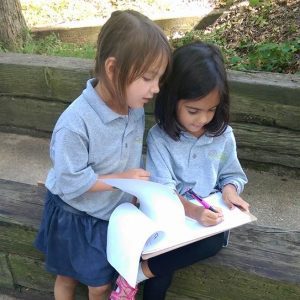 Bob Nardo: We use the CKLA Listening and Learning strand fully from Kindergarten up, with 45 minutes to an hour group time every single day. The teachers present the Listening and Learning lessons with all of the interactive discussion. In alignment with Montessori’s vision of “cultural” and “cosmic” education, students go forth from the lessons to individualized follow-up work. The students go out and use our beautiful library of domain literature throughout the rest of the day and the week. They do additional research, explore their interests, and extend their work with writing reports that they present to the class—about ancient Greece or botany or astronomy, or whatever they have learned about from all the CKLA domains.
Bob Nardo: We use the CKLA Listening and Learning strand fully from Kindergarten up, with 45 minutes to an hour group time every single day. The teachers present the Listening and Learning lessons with all of the interactive discussion. In alignment with Montessori’s vision of “cultural” and “cosmic” education, students go forth from the lessons to individualized follow-up work. The students go out and use our beautiful library of domain literature throughout the rest of the day and the week. They do additional research, explore their interests, and extend their work with writing reports that they present to the class—about ancient Greece or botany or astronomy, or whatever they have learned about from all the CKLA domains.
So it’s built around the backbone of content, with the additional motivation of student inquiry and desire to learn and to share with each other. Let me to assure you that the children are hungry to learn more about the world. They love their CKLA time. It’s a beautiful time when we all gather around to share these discussions.
Don Hirsch: That is what I was going to ask you, how the children are responding.
Bob Nardo: Our kids want to learn about the world and master their environment. It makes the children more confident. They love it. They love having common discussions and learning about the world.
Don Hirsch: If children are confident in that way, they are likely to accomplish more.
Bob Nardo: We agree. So, like other schools we use the Listening and Learning, but the follow-up work is more personalized.
Don Hirsch: Personalizing in that sense—to the child’s interests, abilities, and talents—is simply good teaching! What about standardized testing, which itself is not content-based?
Bob Nardo: Most standardized tests assess only what is easy to teach and measure in the short-term (and governments reward and punish schools based on this), while a content-rich curriculum is a long term investment. We don’t sacrifice content knowledge, which is necessary but not tested, for the sake of maximizing short term scores.
Don Hirsch: So, you say they are using all the Listening and Learning lessons, but the readings are organized by grade. How do you use CKLA in your multi-age classrooms?
Bob Nardo: The follow-up work and the independent practice are individualized. Our classrooms are organized in multi-age groups based on Montessori’s insights about child development. These include Primary (pre-K and K), Lower Elementary (1 through 3), and Upper Elementary (3 or 4 and 5). For the Listening and Learning hour, most of the children break out into two or three small groups. The teacher works with these groups separately, while the other children are working on something else, perhaps with the other adult in the room. While the groups are generally organized by age, sometimes a younger or older child will be asked by the teacher to work with another age group. Or it may be driven by the child who inches over to listen, for a beautiful multi-age interaction, as it was prior to industrialized schooling.
Don Hirsch: A central tenet of my research is that in the early grades, a broad rich curriculum of specific sequenced knowledge is necessary as a base for the later grades of exploration. What I am hearing is that the first graders are doing first grade work in the early part of the day with more flexibility in a later part of the day?
Bob Nardo: Essentially, yes, with some important exceptions for children’s abilities or interest in listening in to another group for the part of the day explicitly dedicated to CKLA. There is nothing contrary to Montessori about that. She was all about reading aloud to kids, sharing oral stories and sharing knowledge in that way. The difference in our school is that we do not interrupt kids and make the whole group shift to another subject all at once. In our interdisciplinary, three-hour “work cycle,” children choose from a set of meaningful work options prepared by the teacher. So a child might proceed to choose among books within the domain of knowledge the group is exploring; after the group read-aloud, they follow up with their own research and exploration. We encourage each child to take a book of their interest and have a rich experience within this common knowledge domain. We do not have all these schedule transitions that schools typically have that frankly waste valued time.
Don Hirsch: What about writing? One of the reasons for great writers is that they are also great orators. What is your process for oral expression and then writing? How about having the kids make speeches to their classmates? Maybe that is one thing we have forgotten, that our great writers knew how to make the case orally, with rhetoric.
 Bob Nardo: First, writing. One thing we are doing in response to standards, especially in the later elementary grades, is increasing expectations for student writing. We are developing our own fourth grade language program around the content of CKLA, but referencing state standards for the writing expectations. Similar to how CKLA distinguishes between decoding and comprehension in reading, we have Montessori and other resources to develop the mechanics of writing, and then we use great literature as models of richness and expression of language for the children. It’s embarrassing and tragic to see the quality of texts now used in many schools. Core Knowledge, especially with the domain trade books, has done a great job of raising the quality of nonfiction texts.
Bob Nardo: First, writing. One thing we are doing in response to standards, especially in the later elementary grades, is increasing expectations for student writing. We are developing our own fourth grade language program around the content of CKLA, but referencing state standards for the writing expectations. Similar to how CKLA distinguishes between decoding and comprehension in reading, we have Montessori and other resources to develop the mechanics of writing, and then we use great literature as models of richness and expression of language for the children. It’s embarrassing and tragic to see the quality of texts now used in many schools. Core Knowledge, especially with the domain trade books, has done a great job of raising the quality of nonfiction texts.
For oral language, we do lots of work on blending and segmenting, and vocabulary, and we encourage the kids to recite poetry and stories together. We don’t want to neglect the expression and style of language. We do all the CKLA domains, and often the teacher presents amazing literature consistent with the domain.
Don Hirsch: Let’s get agreement on this: The actual ordering of topics in many cases is arbitrary, but it’s incredibly important to have an agreement on the ordering. Especially with all of this student mobility in big city districts, sometimes up to 30%, there is an obligation to have some sort of common sequence.
Bob Nardo: We are very comfortable with that. We deepen CKLA with classic literature, but we stay within the same domain.
Don Hirsch: That’s fine! One can rely on all sorts of very good curriculum. But the agreed-upon sequence should be sacrosanct.
Bob Nardo: CKLA really assists our lift. Providing CKLA everywhere would improve education. Finding teachers who are as knowledgeable about the world as they need to be is a significant limitation. Our teachers need to be curious about the world and well prepared to engage students with it. Mario Montessori said that the best preparation for a teacher in their method was a liberal arts education.We find people who have a sense of wonder, invite them to become our teachers, and offer lots of professional development.
We meet with our teachers for a full month before school starts to learn among ourselves, and then continue this learning throughout the year. We work with our hands, read poetry as a group of educators, and classics such as Shakespeare. Our kids need educated adults to talk to and listen to. We are building that knowledge within ourselves.
Don Hirsch: It sounds like your teachers are getting a splendid continuing education! To get back to where we started: How do Montessori principles mesh with Core Knowledge?
Bob Nardo: A great insight Maria Montessori had was “from the hand to the mind”—thinking about the concrete experiences we can invite children to have with beautiful things in the world. We spend thousands of dollars on hands-on physical materials, but I would emphasize that we do not consider our work to be “project-based.”We present beautiful and high-quality materials, Core Knowledge lessons, read-alouds followed by discussions, integrated in the cultural and cosmic curriculum of Montessori—great lessons on the fundamental needs of human beings—inviting kids to inquire and investigate in a disciplined way through their own research and work. We invite children into a world of wonder.
 “These scores are a reflection of a solid classical, college-preparatory curriculum we’ve built atop the powerful Core Knowledge Curriculum we use in grades K-8,” Liberty Common School Headmaster Bob Schaffer said in a news release. “Liberty Common students worked hard for these results; they belong to them. The school provides a conducive environment, and extraordinary college-level instructors, but the students furnish the most essential element in achieving this milestone—
“These scores are a reflection of a solid classical, college-preparatory curriculum we’ve built atop the powerful Core Knowledge Curriculum we use in grades K-8,” Liberty Common School Headmaster Bob Schaffer said in a news release. “Liberty Common students worked hard for these results; they belong to them. The school provides a conducive environment, and extraordinary college-level instructors, but the students furnish the most essential element in achieving this milestone—

 Bob Nardo: We use the CKLA Listening and Learning strand fully from Kindergarten up, with 45 minutes to an hour group time every single day. The teachers present the Listening and Learning lessons with all of the interactive discussion. In alignment with Montessori’s vision of “cultural” and “cosmic” education, students go forth from the lessons to individualized follow-up work. The students go out and use our beautiful library of domain literature throughout the rest of the day and the week. They do additional research, explore their interests, and extend their work with writing reports that they present to the class—about ancient Greece or botany or astronomy, or whatever they have learned about from all the CKLA domains.
Bob Nardo: We use the CKLA Listening and Learning strand fully from Kindergarten up, with 45 minutes to an hour group time every single day. The teachers present the Listening and Learning lessons with all of the interactive discussion. In alignment with Montessori’s vision of “cultural” and “cosmic” education, students go forth from the lessons to individualized follow-up work. The students go out and use our beautiful library of domain literature throughout the rest of the day and the week. They do additional research, explore their interests, and extend their work with writing reports that they present to the class—about ancient Greece or botany or astronomy, or whatever they have learned about from all the CKLA domains. Bob Nardo: First, writing. One thing we are doing in response to standards, especially in the later elementary grades, is increasing expectations for student writing. We are developing our own fourth grade language program around the content of CKLA, but referencing state standards for the writing expectations. Similar to how CKLA distinguishes between decoding and comprehension in reading, we have Montessori and other resources to develop the mechanics of writing, and then we use great literature as models of richness and expression of language for the children. It’s embarrassing and tragic to see the quality of texts now used in many schools. Core Knowledge, especially with the domain trade books, has done a great job of raising the quality of nonfiction texts.
Bob Nardo: First, writing. One thing we are doing in response to standards, especially in the later elementary grades, is increasing expectations for student writing. We are developing our own fourth grade language program around the content of CKLA, but referencing state standards for the writing expectations. Similar to how CKLA distinguishes between decoding and comprehension in reading, we have Montessori and other resources to develop the mechanics of writing, and then we use great literature as models of richness and expression of language for the children. It’s embarrassing and tragic to see the quality of texts now used in many schools. Core Knowledge, especially with the domain trade books, has done a great job of raising the quality of nonfiction texts.